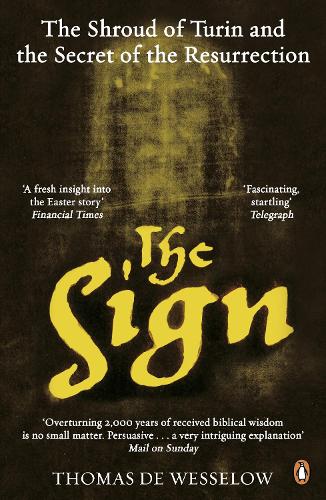
The Sign: The Shroud of Turin and the Secret of the Resurrection
Publishing Details
The Sign: The Shroud of Turin and the Secret of the Resurrection
By (Author) Thomas de Wesselow
Penguin Books Ltd
Penguin Books Ltd
22nd May 2013
United Kingdom
Classifications
Professional and Scholarly
Non Fiction
History of religion
909
Physical Properties
496
Width 129mm, Height 198mm, Spine 35mm
500g
Description
The greatest mystery in history. Finally solved The birth of Christianity, nearly 2000 years ago, has shaped the whole course of human history. Yet historians still cannot explain how it all really began. What made Jesus's followers claim to have seen him alive again, three days after his crucifixion Why did Christianity take off so quickly It is one of the biggest and most profound of all historical mysteries. This extraordinary book, based on seven years of secret research by a brilliant historian, finally provides the answer. And it lies an enigmatic relic long assumed to be a fake- the Shroud of Turin. With historical detective work and cutting-edge scientific research, art historian Thomas de Wesselow has discovered that Jesus's followers did see something at the tomb. They saw something real but out of the ordinary - something that seemed like a miracle. It was the burial cloth of Jesus, stained with his body image. This ancient marvel was hailed as a sign of the Resurrection, and kick-started the Christian faith. As well as a major historical breakthrough, The Sign is a truly thrilling read - and one you will never forget.
Reviews
A fresh insight into the Easter story * Financial Times *
Overturning 2,000 years of received biblical wisdom is no small matter. Consequently [this] book encompasses an impressive amount of scholarship and scientific examination. Persuasive... a very intriguing explanation -- Michael Prodger * Mail on Sunday *
Thorough, well-researched and fair-minded... Persuasive... much more than just an addition to the canon of Shroud literature * Irish Times *
Fascinating...startling * Telegraph *
Author Bio
Thomas de Wesselow earned his MA and PhD at London's Courtauld Institute, researching the controversial Guidoriccio fresco in Siena, before becoming a Scholar at the British School in Rome where he worked on another of the great mysteries of Italian art history, the Assisi Problem. He has written on a number of famous Renaissance pictures whose meanings have hitherto defied analysis, including Botticelli's Primavera and Titian's Sacred and Profane Love. Since 2007 he has been researching this book full-time. He is 40 years old and he lives in Cambridge.
